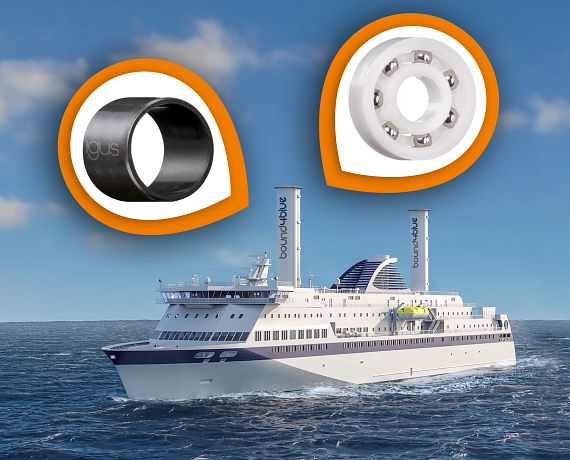With automatic drive systems, ships use 40% less fuel
Profile
What was needed?
Alternatives to metallic solutions that are lightweight, low-maintenance and can perfectly withstand loads at low speeds
Requirements:
Wing sails can be rotated by 360°, high environmental requirements, such as a wide temperature range, high humidity, seawater, water waves and high wind speeds
Industries:
Shipbuilding/Maritime technology
Success for the customer:
Despite green technology at open sea, the application was very specialised and igus provided comprehensive project support in the selecting the bearing components. The ball and plain bearings have been operating at maximum performance without any failures since installation.
Alternatives to metallic solutions that are lightweight, low-maintenance and can perfectly withstand loads at low speeds
Requirements:
Wing sails can be rotated by 360°, high environmental requirements, such as a wide temperature range, high humidity, seawater, water waves and high wind speeds
Industries:
Shipbuilding/Maritime technology
Success for the customer:
Despite green technology at open sea, the application was very specialised and igus provided comprehensive project support in the selecting the bearing components. The ball and plain bearings have been operating at maximum performance without any failures since installation.

bound4blue supplies automatic wind-assisted drive systems ('wingsails') that use renewable energy for all ship owners and operators who want to reduce their fuel costs and pollutant emissions and save up to 40% of fuel consumption. The shipping industry is a massive cause of environmental pollution and faces costly emission reduction regulations that present it with a double challenge: fuel consumption accounts for between 30 and 60% of a ship's operating costs, depending on fuel costs and ship type and size. In addition, shipping is a major contributor to global CO2 emissions as well as nitrogen oxide (NOx), sulphur oxide (SOx) and particulate (PM10) emissions, which are really harmful to ecosystems and human life (acid rain, greenhouse effect, cardiovascular diseases, etc.).
Two complementary drive systems have been developed that are completely automatic and adjustable to adapt to any wind situation. They allow for fuel savings of up to 40%. One of them can be folded down onto the ship's deck. These systems are designed as additional drive for maritime transport and generate effective thrust from the available wind, an affordable and clean source of energy.
Two complementary drive systems have been developed that are completely automatic and adjustable to adapt to any wind situation. They allow for fuel savings of up to 40%. One of them can be folded down onto the ship's deck. These systems are designed as additional drive for maritime transport and generate effective thrust from the available wind, an affordable and clean source of energy.